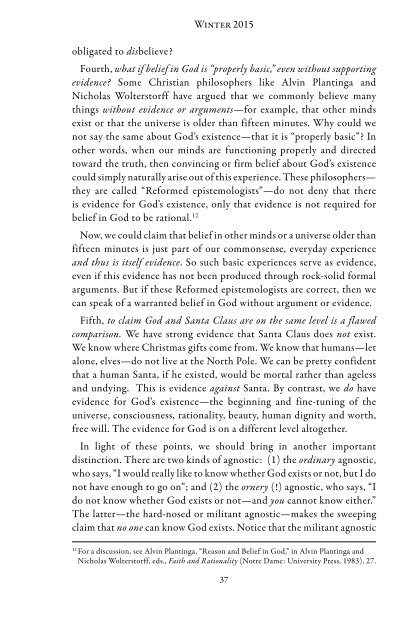THE CITY
h6c7p5d
h6c7p5d
You also want an ePaper? Increase the reach of your titles
YUMPU automatically turns print PDFs into web optimized ePapers that Google loves.
obligated to disbelieve?<br />
Winter 2015<br />
Fourth, what if belief in God is “properly basic,” even without supporting<br />
evidence? Some Christian philosophers like Alvin Plantinga and<br />
Nicholas Wolterstorff have argued that we commonly believe many<br />
things without evidence or arguments—for example, that other minds<br />
exist or that the universe is older than fifteen minutes. Why could we<br />
not say the same about God’s existence—that it is “properly basic”? In<br />
other words, when our minds are functioning properly and directed<br />
toward the truth, then convincing or firm belief about God’s existence<br />
could simply naturally arise out of this experience. These philosophers—<br />
they are called “Reformed epistemologists”—do not deny that there<br />
is evidence for God’s existence, only that evidence is not required for<br />
belief in God to be rational. 12<br />
Now, we could claim that belief in other minds or a universe older than<br />
fifteen minutes is just part of our commonsense, everyday experience<br />
and thus is itself evidence. So such basic experiences serve as evidence,<br />
even if this evidence has not been produced through rock-solid formal<br />
arguments. But if these Reformed epistemologists are correct, then we<br />
can speak of a warranted belief in God without argument or evidence.<br />
Fifth, to claim God and Santa Claus are on the same level is a flawed<br />
comparison. We have strong evidence that Santa Claus does not exist.<br />
We know where Christmas gifts come from. We know that humans—let<br />
alone, elves—do not live at the North Pole. We can be pretty confident<br />
that a human Santa, if he existed, would be mortal rather than ageless<br />
and undying. This is evidence against Santa. By contrast, we do have<br />
evidence for God’s existence—the beginning and fine-tuning of the<br />
universe, consciousness, rationality, beauty, human dignity and worth,<br />
free will. The evidence for God is on a different level altogether.<br />
In light of these points, we should bring in another important<br />
distinction. There are two kinds of agnostic: (1) the ordinary agnostic,<br />
who says, “I would really like to know whether God exists or not, but I do<br />
not have enough to go on”; and (2) the ornery (!) agnostic, who says, “I<br />
do not know whether God exists or not—and you cannot know either.”<br />
The latter—the hard-nosed or militant agnostic—makes the sweeping<br />
claim that no one can know God exists. Notice that the militant agnostic<br />
12<br />
For a discussion, see Alvin Plantinga, “Reason and Belief in God,” in Alvin Plantinga and<br />
Nicholas Wolterstorff, eds., Faith and Rationality (Notre Dame: University Press, 1983), 27.<br />
37


